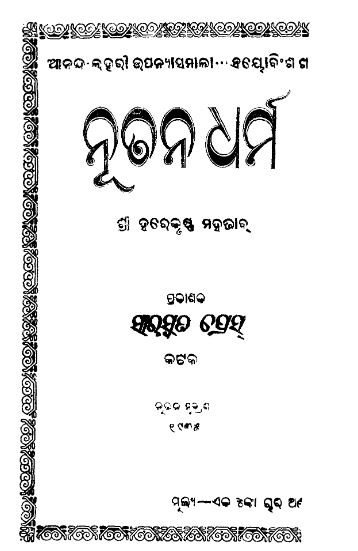Published in 1935, Nutana Dharma is a significant novel by the distinguished Odia writer Harekrushna Mahatab. Renowned not just as a novelist but also as a prominent politician and statesman, Mahatab’s multifaceted career greatly influenced his literary works, allowing him to weave rich narratives that resonate with sociopolitical themes. Nutana Dharma, which translates to New Religion, stands as a testament to his keen insight into the socio-cultural landscape of Odisha during a time of profound change.
At the heart of Nutana Dharma is a compelling narrative centered around the struggles for self-identity and the quest for modernity in a rapidly transforming society. The story unfolds in a traditional Odia setting, where the characters grapple with the clash between age-old customs and the impetuous wave of modernization and reform. Through a carefully crafted plot and vivid character development, Mahatab takes readers on a journey that explores the nuances of faith, tradition, and the aspiration for a new moral and spiritual order.
The protagonist, embodying the ethics of the time, navigates a world grappling with colonial influences and the resurgence of indigenous identity. His journey reflects the broader societal changes as Odisha—like the rest of India—was undergoing significant transformations in thought and culture. As the protagonist engages with various social issues, including caste dynamics, feudalism, and the role of women, Mahatab skillfully critiques the status quo while advocating for progressive thought.
Mahatab’s characters are vividly drawn, representing a spectrum of ideals and beliefs. Each character embodies varying responses to modernization, symbolizing the internal conflict faced by society as a whole. Through their interactions and struggles, the novel delves into themes of love, betrayal, faith, and personal growth. The characters are not mere archetypes; they are complex individuals whose journeys resonate with readers, inviting them to reflect on their own beliefs and challenges.
A pivotal theme in Nutana Dharma is the interplay between tradition and modernity. Mahatab highlights the necessity of evolving socio-religious beliefs to harmonize with contemporary values without entirely discarding the past. This balancing act is shown through the protagonist’s quest for a new religion, which seeks to adapt the spiritual and moral core of traditional practices to the changing needs of society.
Nutana Dharma serves as a cultural mirror reflecting the zeitgeist of early 20th-century Odisha. In a period marked by colonial oppression, the quest for self-identity and resilience comes through powerfully in Mahatab’s storytelling. His writing not only captures the struggles of the time but also serves as a narrative of hope and renewal.
The book’s impact transcends its literary merit; it fosters a dialogue about the evolution of societal norms and challenges readers to engage with the complexities of change. Mahatab’s nuanced exploration of the new religion inspires reflection on individual beliefs and societal values in an ever-evolving world.
Books Info
| Books name | Nutana Dharma / ନୂତନ ଧର୍ମ |
| Author | Harekrushna Mahatab |
| No Of pages | 249 |
| Publisher | Sraswata Press |
| Publication | 1935 |
| Printed At | NA |
| Distributor | NA |

